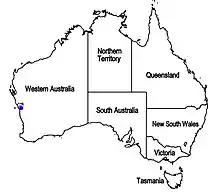Dicrastylis incana
Dicrastylis incana is a species of plant within the genus, Dicrastylis, in the family Lamiaceae.[4] It is endemic to Western Australia.[4]
| Dicrastylis incana | |
|---|---|
| Scientific classification | |
| Kingdom: | Plantae |
| Clade: | Tracheophytes |
| Clade: | Angiosperms |
| Clade: | Eudicots |
| Clade: | Asterids |
| Order: | Lamiales |
| Family: | Lamiaceae |
| Genus: | Dicrastylis |
| Species: | D. incana |
| Binomial name | |
| Dicrastylis incana | |
 | |
| Synonyms[4] | |
|
Dicrastylis morrisonii Munir | |
Description
Dicrastylis incana is a spreading shrub, growing from 30 cm to 1.5 m high, on yellow sands, in open woodlands. Its stems are roughly circular in cross section. The opposite and entire leaves are 10-24 mm long by 1.5-7 mm wide, and have branched (dendritic) hairs. There are no bracteoles, but there are bracts which are 3 to 5 mm long. The flower stalks are 2-4 mm long, and have dendritic hairs, and peltate scale hairs. The calyx has five lobes (1.5-2 mm long), and is covered in dendritic hairs, and the white to cream corolla is 5-8 mm long, with no dots or stripes in its throat. There are five stamens. Flowers may be seen from September to November.[1]
It is found in Beard's South West Province.[1]
References
- "Dicrastylis incana". FloraBase. Western Australian Government Department of Parks and Wildlife. Retrieved 23 November 2020.
- "Dicrastylis incana". Australian Plant Name Index (APNI), IBIS database. Centre for Plant Biodiversity Research, Australian Government. Retrieved 23 November 2020.
- Munir, A.A. (1978). "Taxonomic revision of Chloanthaceae trib. Physopsideae". Brunonia. 1 (4): 484–5, Fig. 12, Map 4. doi:10.1071/BRU9780407. ISSN 0313-4245. Wikidata Q55756057.
- Govaerts, R., et. al. "Plants of the World online: Dicrastylis incana Munir". Board of Trustees of the Royal Botanic Gardens, Kew. 2020. Retrieved 23 November 2020.
